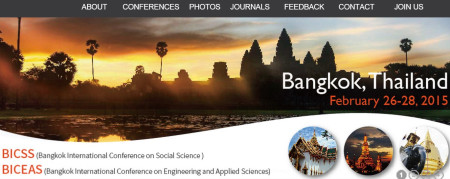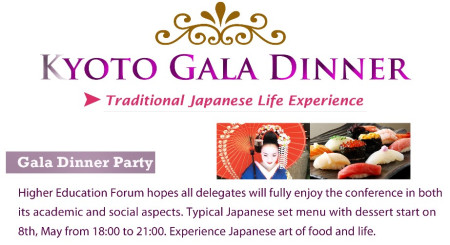
In a recent blog post, I wrote about the Taiwan-based Higher Education Forum — essentially a travel agency that organizes vacation-like conferences marketed to academics in Asia. In this post, I would like to expand on why I think attending Higher Education Forum (HEF) conferences is a poor choice for honest researchers.
Here are the reasons I think that researchers should avoid Higher Education Forum conferences and why universities should not pay for their faculty to attend Higher Education Forum conferences
1. HEF is a for-profit company whose mission is to increase profits for its owners. On the other hand, conferences organized by authentic, non-profit scholarly societies and associations have as their chief mission the creation and sharing of new knowledge. Honest researchers should prefer conferences organized by legitimate academic and scholarly societies and associations.
2. Higher Education Forum conferences generally combine two (or more) broad fields. They do this to make the conferences appeal to more researchers, to maximize their revenue. Here are some examples:
International Conference on Education, Psychology and Society
International Conference on Social Science and Psychology
Global Conference on Engineering and Applied Science
International Symposium on Engineering and Natural Sciences
International Conference on Life Science and Biological Engineering
3. Note that all of HEF’s conferences use the terms “International” or “Global.” This strategy helps attract more registrations and enables presenters to earn more academic credit (an international conference presentation garners more credit than a national or regional one).
4. To maximize profits, HEF often holds two or more conferences at the same time and at the same hotel
5. HEF associates with predatory publishers and works to funnel conference attendees’ papers into the low quality journals they publish. On the HEF website, it says, “All full papers presented in the conference will be considered for possible publications as follow [sic].” Then it provides links to publishers in India, Nigeria, and China that appear on my list of predatory publishers.
6. Higher Education Forum does not take criticism well. After my last blog post, HEF’s public relations manager, Chelsea Kao, sent out numerous emails, each one labeled as a “press release” attacking me and defending the company. Her numerous press releases cited the impact factors of all the journals that HEF associates with, but the impact factors were all assigned by fake impact factor companies, so the silly press releases, which were sent to various University of Colorado officials, confirmed that HEF associates with predatory publishers.

7. For conference presentations, there is a very short time between the submission deadline and the “notification of acceptance,” leading one to conclude that no real review is completed on the submissions, and they are most all accepted so the conference can make more money. Also, the deadlines invariably get extended. There’s no mention of any peer-review.

8. HEF conference registration is not cheap; it costs $400 to attend for those presenting papers. According to the website for one of their conferences:
“The calculation of registration fee is according to the piece of manuscript submitted by the author. For instance, if you only have one paper to submit, you will have to pay 400*1=400 USD. However, if you would like to submit three research papers, you will have to pay up to 400*3=1200 USD.”
They also charge a processing fee for those using PayPal, and they do not grant refunds for any reason.
Higher Education Forum organizes vacation packages and markets them as scholarly conferences. The firm associates with predatory publishers and encourages conference attendees to submit their papers to these publishers’ journals, where they are easily and quickly published upon payment of additional fees paid by the authors.
I recommend that scholars only attend scholarly conferences organized by authentic scholarly organizations. I recommend that universities not sponsor faculty attendance at conferences that are essentially vacations, like those given by Higher Education Forum.
By: Jeffrey Beall
Follow on Twitter
Source: Scholarly Open Access
Comments:
Ken Lanfear says:
March 13, 2015 at 7:50 AM
Jeff, I see “vacation conferences” as a far less serious threat than predatory journals. Even legitimate conference planners know it’s easier to attract folks to nice places, at least within reason. Since it’s often not a clear-cut situation, trying to restrict travel could cause more problems than it would solve.
Conference proceedings papers usually count far less than journal papers for tenure and advancement. Someone looking to promote fake science would get more bang for the buck paying a predatory journal.
The problem of predatory journals is very real and threatens the credibility of our science. I think “vacation conferences” are largely a problem between employees, employers, and the tax collectors.
AlexH says:
March 13, 2015 at 11:14 PM
Conferences are all about networking and are not a tool of fattening our list of publications. With the exception of a few fast-evolving fields like computer science, proceedings publications (even those that are published as a special issue of a scholarly journal) count very little for promotion or grant committees. However -and this is the part where I must disagree with Ken-, fake conference proceedings pollutes scientific literature the same way as predatory journals does as they often give space to sub-par or even pseudoscience and grant an opportunity for citation manipulation. IMHO they are a very real threat to science even though misled or unethical authors are not able to profit from them as much as from predatory journal articles.
Julius Jillbert aka JJ (Julius Jilbert) says:
April 7, 2015 at 3:16 PM
Thanks again Jeffrey for this useful information. Would share this as a remainder for others academe.
Peter Kutschera says:
July 5, 2015 at 5:28 PM
While I respect the overall mission of SOA and its estimable proprietor Dr. Jeffrey Beall, I was somewhat taken aback by this article’s “over the top” headline: “Higher Education Forum: 95% Vacation, 5% Scholarly.” That plus the piece’s rather cursory examination of… OMG… a “for-profit” company – one that in my humble opine is also providing an invaluable academic service and research conference paper exposure opportunity in a very, very vital part of the world. This is especially so for young and aspiring researchers and even older seasoned academics . The many who often find themselves shut out from having their hard work recognized. Or, those who become unfairly burdened by receiving yet another rejection slip from the exclusive and short number of establishment, super highly competitive, sometimes subjectively challenged and occasionally clubby brick and mortar journals SOA recommends as one of the only real alternatives. I am a proud participant, presenter and moderator at a number of HEF conferences in East/Southeast Asia and in Taiwan- the Republic of China, and have encountered many intensely motivated, serious, hard working professional researchers, often in the prime of their careers, who have left me highly impressed with their accomplishments and resolve to contribute mightily to the literature. These conference participants are equally as impressive as the many I’ve also met @ the research association conferences SOA also rightfully recommends. In the interests of improving its value to readers I wish your article and inquiry might have been more “balanced,” and rather less “prosecutorial” in its approach and tone. Unfortunately the incandescent headline and a chunk of content is unfair and not adequately vetted. The article’s basic premise that HEF is a “travel agency” is provocative and gratuitous. How many research and professional conferences stateside conducted by responsible universities and colleges are held routinely at such “travel” destinations as Las Vegas, Miami, Myrtle Beach, New Orleans, St. Petersburg-Tampa, Charleston, SC, Seattle, San Diego or San Juan, PR? Usually I would imagine 95% of attendees at these events are there to make a contribution and that’s what I believe you would encounter attending a HEF conference
Jeffrey Beall says:
July 5, 2015 at 6:00 PM
I stand by my criticism of HEF and recommend that honest researchers not waste their money (or their university’s money) and time attending its vaconferences. Your arguments are fallacious and you should reveal that HEF pays you to give your boring “keynote” talks at some of its almost weekly-held conferences. Evidence shows that this firm has contractual agreements with predatory journals in South Asia and West Africa, journals that use fake impact factors and do little or no peer review, accepting everything submitted. Publishing in such journals could be extremely damaging to the careers of young academics. The ridiculous PR person for HEF sent numerous “press releases” to my university chancellor (apparently she doesn’t know how to do any normal type of correspondence) and her statements revealed that the company is completely clueless about fake impact factors, fake peer review, and predatory publishers. Your comments about attendees of conferences here in the U.S. are unwarranted. Stop trying to play the attendees of different conferences off of each other. This is about HEF and only HEF. It’s a low-quality and questionable conference organizer, and the fact that they hire you as a keynote speaker provides strong evidence for this.





